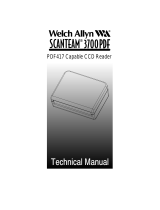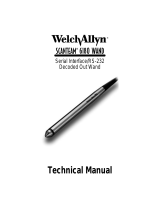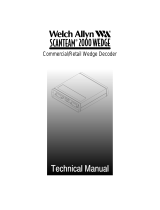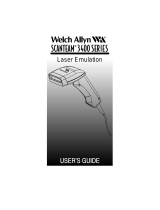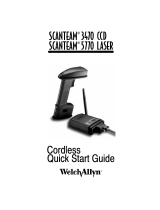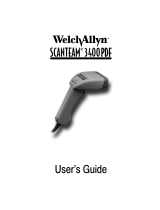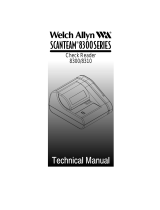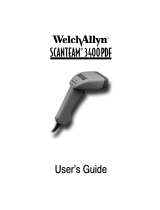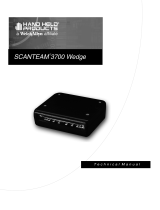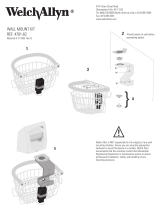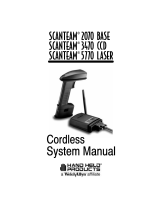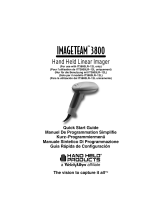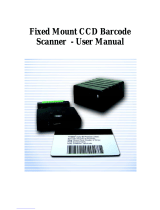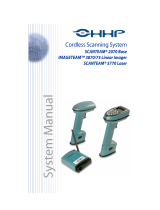Page is loading ...

R
SCANTEAM 3700 CCD

Disclaimer
Welch Allyn, Data Collection, Inc. (d/b/a Hand Held Products) reserves the right to make changes in
specifications and other information contained in this document without prior notice, and the reader should in all
cases consult Hand Held Products to determine whether any such changes have been made. The information in
this publication does not represent a commitment on the part of Hand Held Products.
Hand Held Products shall not be liable for technical or editorial errors or omissions contained herein; nor for
incidental or consequential damages resulting from the furnishing, performance, or use of this material.
This document contains proprietary information which is protected by copyright. All rights are reserved. No
part of this document may be photocopied, reproduced, or translated into another language without the prior
written consent of Hand Held Products.
E2000 Welch Allyn Data Collection, Inc. All rights reserved.
Web Address: www.handheld.com
This device complies with part 15 of the FCC Rules. Operation is subject to the following two
conditions: (1) this device may not cause harmful interference, and (2) this device must accept
any interference received, including interference that may cause undesired operation.
This equipment has been tested and found to comply with the limits for a Class B digital device
pursuant to part 15 of the FCC Rules. These limits are designed to provide reasonable
protection against harmful interference in a residential installation. This equipment
generates, uses, and can radiate radio frequency energy and, if not installed and used in
accordance with the instructions, may cause harmful interference to radio communications.
However, there is no guarantee that interference will not occur in a particular installation. If
this equipment does cause harmful interference to radio or television reception, which can be
determined by turning the equipment off and on, the user is encouraged to try to correct the
interference by one or more of the following measures:
FCC Class B Compliance Statement
Caution: Any changes or modifications made to this device that are not expressly
approved by Welch Allyn, Inc. may void the user’s authority to operate the equipment.
Note: To maintain compliance with FCC Rules and Regulations, cables connected to this device must
be shielded cables, in which the cable shield wire(s) have been grounded (tied) to the connector shell.
This equipment does not exceed the Class B limits for radio noise emissions as described in
the Radio Interference Regulations of the Canadian Department of Communications.
Canadian Notice
Le present appareil numerique n’emet pas de bruits radioelectriques depassant les limites
applicables aux appareils numeriques de la classe B prescrites dans le Reglement sur le
brouillage radioelectrique edicte par le ministere des Communications du Canada.
• Reorient or relocate the receiving antenna.
• Increase the separation between the equipment and receiver.
• Connect the equipment into an outlet on a circuit different from that to which the receiver
is connected.
• Consult the dealer or an experienced radio or television technician for help.
The word SCANTEAM, the SCANTEAM logo, and the Welch Allyn logo are trademarks of Welch Allyn, Inc.
Throughout this manual, trademarked names may be used. Rather than put a trademark (TM) symbol in every
occurrence of a trademarked name, we state that we are using the names only in an editorial fashion, and to the
benefit of the trademark owner, with no intention of infringement.

The CE mark on the product indicates that the system has been tested to and
conforms with the provisions noted within the 89/336/EEC Electromagnetic
Compatibility Directive and the 73/23/EEC Low Voltage Directive.
Welch Allyn shall not be liable for use of our product with equipment
(i.e., power supplies, personal computers, etc.) that is not CE marked and
does not comply with the Low Voltage Directive.
For further information, please contact:
Welch Allyn Ltd.
1st Floor
Dallam Court Dallam Lane
Warrington, Cheshire WA2 7LT
England
Patents
The SCANTEAM 3700 product is covered by the following U.S. Patent: 5,932,862. Other U.S. and foreign patents pending.


i
TABLE OF CONTENTS
Disclaimer
Agency Compliance
Chapter 1 SCANTEAM 3700 Description
Section Page
1.1 Introduction 1–1. . . . . . . . . . . . . . . . . . . . . . . . . . . . . . . . . . . . . . . . . .
1.2 SCANTEAM 3700 Hardware Description 1–1. . . . . . . . . . . . . . . .
1.2.1 Interface Port 1–2. . . . . . . . . . . . . . . . . . . . . . . . . . . . .
1.2.2 Nonvolatile Memory 1–2. . . . . . . . . . . . . . . . . . . . . . . .
1.3 SCANTEAM 3700 Software Description 1–2. . . . . . . . . . . . . . . . .
Chapter 2 System Hardware Description
Section Page
2.1 Introduction 2–1. . . . . . . . . . . . . . . . . . . . . . . . . . . . . . . . . . . . . . . . . .
2.2 General Characteristics of the 3700 2–2. . . . . . . . . . . . . . . . . . . . .
2.2.1 Mechanical Layout of the 3700 2–2. . . . . . . . . . . . . .
2.2.2 Single Modular Connector Port 2–3. . . . . . . . . . . . . .
2.2.3 Audible Indicator 2–3. . . . . . . . . . . . . . . . . . . . . . . . . . .
2.2.4 Mounting Inserts 2–3. . . . . . . . . . . . . . . . . . . . . . . . . . .
2.3 Operating Theory 2–3. . . . . . . . . . . . . . . . . . . . . . . . . . . . . . . . . . . . .
2.4 Scanner/Host Communication 2–4. . . . . . . . . . . . . . . . . . . . . . . . . .
2.4.1 Communications Port 2–4. . . . . . . . . . . . . . . . . . . . . .
2.4.2 Asynchronous ASCII Interface 2–4. . . . . . . . . . . . . . .
2.4.3 Hardwire Pinouts 2–5. . . . . . . . . . . . . . . . . . . . . . . . . .
2.5 Power Requirements 2–6. . . . . . . . . . . . . . . . . . . . . . . . . . . . . . . . . .
Chapter 3 Set–Up and Installation
Section Page
3.1 Introduction 3–1. . . . . . . . . . . . . . . . . . . . . . . . . . . . . . . . . . . . . . . . . .
3.2 General Preparation for Use 3–1. . . . . . . . . . . . . . . . . . . . . . . . . . .
3.3 Set–Up Procedure for Evaluation of the 3700 3–2. . . . . . . . . . . .
3.3.1 Preparation 3–2. . . . . . . . . . . . . . . . . . . . . . . . . . . . . . .
3.3.2 Set–up Procedure 3–3. . . . . . . . . . . . . . . . . . . . . . . . .
3.4 Installation in the Host Instrument 3–4. . . . . . . . . . . . . . . . . . . . . . .

ii
Chapter 4 Configuring the SCANTEAM 3700
Section Page
4.1 Preparation 4–1. . . . . . . . . . . . . . . . . . . . . . . . . . . . . . . . . . . . . . . . . .
4.2 Command Conventions 4–2. . . . . . . . . . . . . . . . . . . . . . . . . . . . . . .
4.3 Operational Commands 4–3. . . . . . . . . . . . . . . . . . . . . . . . . . . . . . .
4.4 Configuration Commands 4–5. . . . . . . . . . . . . . . . . . . . . . . . . . . . . .
4.5 Configuration Status Query Commands 4–15. . . . . . . . . . . . . . . . .
4.6 Default Operating Parameters 4–16. . . . . . . . . . . . . . . . . . . . . . . . . .
Chapter 5 Service/Technical Assistance
Section Page
5.1 Maintenance 5–1. . . . . . . . . . . . . . . . . . . . . . . . . . . . . . . . . . . . . . . . .
5.2 Troubleshooting Guide 5–1. . . . . . . . . . . . . . . . . . . . . . . . . . . . . . . .
5.2.1 Troubleshooting Hints 5–1. . . . . . . . . . . . . . . . . . . . . .
5.2.2 Diagnostic Procedure 5–2. . . . . . . . . . . . . . . . . . . . . .
5.2.3 Troubleshooting Checklist 5–2. . . . . . . . . . . . . . . . . .
5.3 Obtaining Factory Service 5–3. . . . . . . . . . . . . . . . . . . . . . . . . . . . .
5.3.1 Service Under Warranty 5–4. . . . . . . . . . . . . . . . . . . .
5.3.2 Out of Warranty Service 5–4. . . . . . . . . . . . . . . . . . . .
5.4 SCANTEAM 3700 Removal/Replacement 5–5. . . . . . . . . . . . . . .

iii
Appendices
A CCD Operation and Bar Code Scanning
A.1 Objectives A–1. . . . . . . . . . . . . . . . . . . . . . . . . . . . . . . .
A.2 Scanning and Decoding a Bar Code Symbol A–1. .
A.3 Bar Code Basics and Scanning Techniques A–4. . .
B Technical Specifications
B.1 Scanner Performance B–1. . . . . . . . . . . . . . . . . . . . . .
B.2 Optical Specifications B–1. . . . . . . . . . . . . . . . . . . . . .
B.3 Electrical Specifications B–3. . . . . . . . . . . . . . . . . . . .
B.4 Environmental Specifications B–4. . . . . . . . . . . . . . . .
B.5 Mechanical Specifications B–5. . . . . . . . . . . . . . . . . .
B.6 Bar Code Label Specifications B–5. . . . . . . . . . . . . . .
B.7 SCANTEAM 3700 Interface Cable B–6. . . . . . . . . . .
C Serial Commands Summary
C.1 Configuration Commands C–1. . . . . . . . . . . . . . . . . . .
C.2 Operational Commands C–2. . . . . . . . . . . . . . . . . . . .
C.3 Configuration Status Query Commands C–2. . . . . . .
C.4 Default Configuration Settings C–3. . . . . . . . . . . . . . .
D ASCII Conversion Table
Glossary
Index
SCANTEAM 3700 Limited Warranty

iv
List of Tables
Table Page
4.1 SCANTEAM 3700 Code ID Values 4–7. . . . . . . . . . . . . . . . . . . . . .
5.1 SCANTEAM 3700 Troubleshooting Checklist 5–2. . . . . . . . . . . . .
List of Illustrations
Figure Page
2.1 Basic System Operation 2–1. . . . . . . . . . . . . . . . . . . . . . . . . . . . . . .
2.2 3700 Fixed Mount CCD Dimensions 2–2. . . . . . . . . . . . . . . . . . . .
2.3 Basic Scanner/Decoder Operation 2–3. . . . . . . . . . . . . . . . . . . . . .
3.1 SCANTEAM 3700 Identification Label 3–2. . . . . . . . . . . . . . . . . . .
3.2 Mounting Dimensions for the 3700 3–5. . . . . . . . . . . . . . . . . . . . . .
3.3 Examples of SCANTEAM 3700 Barcode Orientation 3–6. . . . . .
3.4 SCANTEAM 3700 Pitch, Skew & Tilt Tolerance 3–7. . . . . . . . . . .
3.5 Specular Reflection Interference 3–7. . . . . . . . . . . . . . . . . . . . . . . .
3.6 Scanner Illumination Clearance 3–8. . . . . . . . . . . . . . . . . . . . . . . .
A.1 Main Elements of the 3700 CCD Bar Code System A–1. . . . . . .
A.2 SCANTEAM 3700 Timing Sequence A–3. . . . . . . . . . . . . . . . . . . .

v
Preface
Intended Audience
This manual is written for users familiar with serial data communications. An
understanding of integrated circuitry and bar code technology is recommended.
Overview of the Technical Manual
Chapter 1 provides a brief description of SCANTEAM 3700 software and hardware.
Chapter 2 discusses the system’s hardware, including connectors, ports, and power
requirements.
Chapter 3 explains how to set up and install your 3700 Machine Mount CCD.
Chapter 4 describes the default operating and configuration parameters and explains
how to change these to meet your specific needs using serial commands sent through the
host RS–232 communications interface. Explains how to use the configuration status
query commands.
Chapter 5 explains how to obtain service and technical assistance.
Appendix A is a guide to CCD operation, bar code basics and scanning techniques.
Appendix B provides information about scanning performance, optical, electrical,
environmental, mechanical and bar code label specifications.
Appendix C lists the configuration, operational and configuration status query serial
commands. The default configuration settings are also listed.
Appendix D provides an ASCII conversion chart.

vi
Related Publications
Reading Between the Lines: An Introduction to
Bar Code Technology
Craig K. Harmon and Russ Adams
1989 Helmers Publishing Inc.
174 Concord Street
Peterborough, NH 03458
(603) 924–9631
The Bar Code Book: Reading, Printing, and
Specification of Bar Code Symbols
Roger C. Palmer
1989 Helmers Publishing Inc.
174 Concord Street
Peterborough, NH 03458
(603) 924–9631
Handbook of Bar Coding Systems
Harry E. Burke
1984 NCR Corporation
Van Nostrand Reinhold Company, Inc.
115 Fifth Avenue
New York, New York 10003
Automatic ID Resource Catalog
AIM USA Publications
634 Alpha Drive
Pittsburgh, PA 15238–2802
Fax: 412–963–8753
Phone: 412–963–8588
AIM “Guidelines on Symbology Identifiers,” “Uniform Symbology Specifications”
(USS), and other AIM resources from the address above.

SCANTEAM 3700 Description 1–1
SCANTEAM 3700 DESCRIPTION
1
1.1 Introduction
The Hand Held Products SCANTEAM 3700 is a fixed mount CCD bar code scanner
with integral decoder for easy integration into host equipment. Typical host equipment
with bar code requirements satisfied by the 3700 include automated clinical chemistry
analyzers, pharmaceutical label verification systems, industrial automation equipment,
robotic systems, materials handling equipment, library systems, point of sale terminals
and office equipment.
The 3700 features Hand Held Products’ time–proven decoding algorithms in a
microprocessor–controlled bar code scanner/decoder and offers configurable operating
parameters, providing you with the capability to tailor the 3700 to your present
requirements and the flexibility to meet your future application requirements.
The following features are available with every SCANTEAM 3700:
• Economical, reliable, safe CCD scanning technology
• Audible indicator configurable for good read or no read
• True RS–232 data communications with RTS/CTS, XON/XOFF, ACK/NAK
• Autodiscrimination of 6 bar code symbologies
• 100 scans per second (standard); other scan rates available
• Flexible scan trigger configurations
• Decoder configurable for high security
• Scan voting to ensure bar code data integrity
• Automatic read timeout
• Ease of configuration through RS–232 interface
1.2 SCANTEAM 3700 Hardware Description
The SCANTEAM 3700 housing is molded ABS formed to enclose the optics platform
and electronics. Standard housing width is 3.5 inches (88.9mm). The housing length is
2.9 inches (73.7mm) and the height is fixed at 1.05 inches (26.7mm).
The scanner uses red (660 nm wavelength) LED’s to illuminate the bar code label. A
high resolution CCD (charge coupled device) is used as an image or reading sensor. A
trigger signal can direct the 3700 to read the bar code. The trigger signal may originate
from the scanner itself, from a host serial communications program, or from a hardware
object sensor. The scanned code is converted to a digital signal in the scanner, then
decoded and sent to the host computer or system. Scan width and focal point of the
optics may be customized to the particular requirements of your application.

1–2 SCANTEAM 3700 Description
Communication is achieved using full duplex, asynchronous serial ASCII through a
bidirectional RS–232 connection to the host system. The host defines or sets the
configurable features and controls the operation of the 3700. The 3700’s configuration
may be stored in non–volatile memory.
Note: In this manual, the term “host” refers to any computer that communicates with the
SCANTEAM 3700 through its RS–232 port. During the configuration procedure, the host
can be the main computer which controls the entire application, or can be a PC which has
been connected to the 3700 for just that purpose. The terms “host instrument,” “host
equipment,” and “host device” all refer to the system in which the 3700 has been
integrated and which communicates with, controls and configures the operating features.
1.2.1 Interface Port
The SCANTEAM 3700 has one port for I/O and Power. The port is a 10 pin RJ11
modular female connector. Hardwire connection to the scanner motherboard is available
for additional features Pin assignments and function descriptions are presented in
Appendix B. Cables are available from Hand Held Products for evaluation of the 3700.
Hand Held Products can provide custom cables for host integration. A modular
connector was chosen as the standard configuration for ease in servicing the scanner once
installed..
1.2.2 Nonvolatile Memory
The 3700 contains nonvolatile FLASH memory which is used to store operating
parameters configured by means of host serial commands. This memory is easily
reconfigurable to modify or add symbologies, as well as to modify or add serial
commands to emulate a currently installed scanner.
1.3 SCANTEAM 3700 Software Description
SCANTEAM 3700 software employs Hand Held Products’ time–proven decoding
algorithms, controls the microprocessor functions, selects the scanner ports, decodes the
bar codes, and formats the serial output messages.
The 3700 standard default parameters can be easily reconfigured to meet most scanning
requirements. Application–specific features and options are configurable through the
RS–232 communications link to the host system.
The 3700 can be configured to autodiscriminate among the following bar code
symbologies and their variations: Codabar, Code 39, Code 128, Interleaved 2 of 5, UPC
and EAN. Most common bar code options, such as validating symbol length and
optional check character, are supported and easily selected. Symbologies can be added
from Hand Held Products’ library of decoding algorithms.
In addition to decoding selections; data output formats, such as preamble and postamble
strings, and operating parameters are also configurable through the host RS–232 serial
communications connection.

System Hardware Description 2–1
SYSTEM HARDWARE DESCRIPTION
2
2.1 Introduction
The major components of the system are the SCANTEAM 3700 Machine Mount CCD
and the host instrument or equipment. Electrical power is generally supplied to the 3700
Machine Mount CCD by the host system. Figure 2.1 shows the functional relationships
between the components of the basic system.
Scanning Circuitry ✺
Scans Bar Code
Auxiliary Trigger
Device
(Optional)
SCANTEAM
3700
Machine
Mount CCD
Host System
Power Supply
Decoder
Host Application
Asynchronous
Communication
Supplies Power to 3700 (typically)
Sends Configuration Commands
Sends Operational Commands
Sends Configuration Status Query
Commands
Sends Software Trigger Signal
(Optional)
Enables Scanning Circuitry
Reads Bar Code
Sends Decoded Bar Code
to Host
Bar Code
Provides Data Input
Triggers Decoder
Aux Trigger
✺ Scanning circuitry is internal to 3700.
Figure 2.1 Basic System Operation

2–2 System Hardware Description
2.2 General Characteristics of the 3700
2.2.1 Mechanical Layout of the 3700
Figure 2.2 shows several views of the SCANTEAM 3700 Machine Mount CCD,
including general dimensions, the location of connectors, and the scanner window.
3.5”
[88.9]
1.05”
[26.7]
2.9”
[73.7]
Top View
Side View
Interface Port
(I/O Communications and Power)
Back View
Front View
Scanner Window
millimeters in brackets [mm]
Mounting Surface
Mounting Surface
Figure 2.2 3700 Fixed Mount CCD Dimensions

System Hardware Description 2–3
2.2.2 Single Modular Input /Output/Power Port
The interface port is an 8–pin female modular connector used for attaching the
Asynchronous Serial Communications Interface Cable. Allows triggering capability (at
pin 2) for an external triggering device, such as an object sensor or a switch. Power and
ground connections are also on this port.
2.2.3 Audible Indicator
The beeper can be disabled by using a configuration command. Refer to Chapter 4 for
information on setting configuration commands. The beeper also sounds on power–up or
reconfiguration as an audible self–check of software configuration.
2.2.4 Mounting Inserts
Inserts are molded into the housing to retain mounting screws. Inserts are available for
metric (3.5) or SAE (#6–32) screws.
2.3 Operating Theory
Figure 2.3 presents a block diagram of the basic SCANTEAM 3700 Machine Mount
CCD operation.
The SCANTEAM 3700 Machine Mount CCD looks for data input from the scanning
circuitry, which includes the LED reflector (illuminates the bar code target), the CCD
sensor and imaging lens (focuses the scattered optical energy from the bar code symbol),
and the peak detectors and comparator (generates a digital representation of the bar code
symbol to send to the microprocessor). Refer to Appendix A, CCD Operation and Bar
Code Scanning, for a detailed explanation of 3700 scanning circuitry operation. When
the 3700 sees a trigger, a read cycle is started. The read cycle is completed when a bar
code is read or the read timeout expires.
Auxiliary Trigger
(Optional)
Peak Detectors
and Comparator
RS–232
Communications
LED Pulse Generator
CCD Sensor
Decode
LED Reflector
Second Scanner
Digital Input
(Optional)
Figure 2.3 Basic Scanner/Decoder Operation
Note: A trigger can be a hardware trigger, such as an object sensor, or a software command,
such as a serial trigger command or continuous read trigger mode command, from the
host. Refer to chapter 4 for description of serial trigger and trigger mode commands..
During a read cycle, the 3700 evaluates scanner data for a valid bar code symbol. If a
valid bar code symbol is seen, data is placed into the output queue where it may be
transmitted to the host through the RS–232 communications port. The 3700 can
optionally be configured to send a “No Read” message when a read cycle times out.

2–4 System Hardware Description
2.4 Scanner/Host Communication
The RS–232 communications interface of the 3700 is used for entering configuration
commands from a PC or host instrument for specific application requirements. The
communications I/O port also sends decoded bar code data to the host.
2.4.1 Communications Port
The communications port connector for the 3700 is an 8–pin female modular socket for
interfacing to the host system or other communications device. Communications
between the host system and the 3700 occur using an Asynchronous ASCII protocol.
Refer to Appendix B for a complete description of pin assignments of the RS–232
communications port.
Caution: Do not use a host communications cable with more wires connected than are
required for the application. Damage to equipment within the system may result if
the communications connection is improperly wired.
2.4.2 Asynchronous Serial ASCII Interface
The Asynchronous serial ASCII Interface operates in Full Duplex Mode. Software
configuration parameters (see Chapter 4) control Baud Rate, Parity, Data Bits, Stop Bits,
Xon/Xoff, ACK/NAK, RTS/CTS, and Pre/Postambles.
Baud rate is a means of expressing data transmission speed, where “baud” equals the
number of signal events per second (roughly equivalent to bits per second). Parity is a
means of checking character bit patterns for validity by confirming if they contain an
Even or Odd number of “1”s. The communications port can be configured to operate at
baud rates of 600, 1200, 2400, 4800, 9600, 19200, and 38400, with even, odd, or no
parity.
Data bits refers to the number of bits used to encode each ASCII character in a data
message. Stop bits refers to the number of stop bits appended to each character. The
communications port can be configured to send 7 or 8 data bits, with 1 or 2 stop bits.
Note: For proper operation the 3700 must be configured for the same baud rate, parity, number
of data bits, and number of stop bits as the connected RS–232 host device.
Xon/Xoff are control characters that refer to ASCII characters “DC1” and “DC3,”
respectively. If enabled, Xon/Xoff is a method to control data flow in the following
manner. Whenever its buffers approaches full, the device receiving communications data
sends an “Xoff” to stop data transmission. The transmitting device stops data
transmission. When its buffer approaches empty, the receiving device sends “Xon” and
the transmitting device starts sending data again. The receiving device refers to the host
instrument. Likewise, the transmitting device refers to the 3700.
Note: The SCANTEAM 3700 will respond to XON and XOFF characters from the host, but will
not send these characters.

System Hardware Description 2–5
ACK/NAK are ASCII characters that allow the receiving device to tell the sending
device to repeat a data message that contains errors. If enabled, the 3700 expects to
receive an ACK (positive acknowledgement of data transmission) or a NAK (negative
acknowledgement of data transmission) from the host after each message is sent. If a
NAK is received, the 3700 repeats the message. After three attempts to transmit have
been made, with successive NAK from the host, the 3700 will discard the message. The
3700 responds to communication from the host with an ACK or NAK.
Pins are available at the I/O Port to support RTS/CTS handshaking. The RTS/CTS
feature may be enabled or disabled in the scanner software configuration. During
communications, the 3700 will raise RTS and wait for CTS before each transmission. In
applications where the host system does not support “handshaking,” the CTS line may be
left unconnected and the 3700 will pull it to the active state. Alternately, if CTS is left
unconnected, RTS/CTS can be disabled by configuration command.
Preambles and postambles are optional ASCII strings that precede and are appended to
each data message sent by the 3700. Typical preamble and postamble strings would
include the ASCII control characters STX (start of text), ETX (end of text), CR (carriage
return) and LF (line feed). An identification character to indicate the type of bar code
read and source scanner port is included in the standard scanner software configuration.
2.4.3 Hardwire Pinouts
The following signals not related to communications are available by hardwiring to the
motherboard (factory ordered with all cable requirements). See Appendix B for the full
lising of available pinouts.
• Pin 1 Boot Strap
• Pin 2 Dig In – Auxiliary
• Pin 3 Reset
• Pin 4 IND – Good Read
Auxiliary Trigger
The scanned data input can be controlled by an external triggering device connected to
the Trigger/Enable line (pin 2 of the Communications port). The actual trigger can be as
simple as a foot actuated relay switch and as sophisticated as an optical sensor.
The Trigger/Enable line action depends on output mode, as follows:
• Bar/Space Output Mode – continuous scan while active
• ASCII Output Mode – read while active – transmit on timeout.

2–6 System Hardware Description
2.5 Power Requirements
DC operating voltage is +5 volts and consumes approximately 200 milliamps when
scanning. Refer to Appendix B for a complete description of voltage range, current
consumption levels, and pin assignments.

Set–Up and Installation 3–1
SET–UP AND INSTALLATION
3
3.1 Introduction
This chapter explains the SCANTEAM 3700 Machine Mount CCD set–up for use in the
design lab and a brief description of installation in a host instrument. The set–up
procedures are intended for a technician or design engineer to explore the functions and
features of the 3700 Machine Mount CCD in a hands–on setting, before the 3700 is
embedded in host equipment. The section on installation in a host instrument includes
the general mounting dimensions of the 3700.
Set–up and installation includes unpacking the unit, checking for possible damage during
shipment, and connecting the Machine Mount CCD to the host system. The host system
in the design lab will typically be a PC/DOS microcomputer with an RS–232
communications port and a serial communications program. Otherwise, the host system
is the instrument or equipment the 3700 is intended to be embedded in.
A Hand Held Products representative will provide application support if needed. Refer
to Chapter 5 for Hand Held Products’ service and technical assistance phone number(s).
3.2 General Preparation for Use
Upon receipt, open the carton. Keep the shipping carton since this should be used in the
event the scanner ever needs to be returned to the factory for service or repair.
Check the part numbers and confirm that each item on the packing list has been supplied.
Check that the scanner model number and any other companion products are the ones
ordered for your application. The scanner model and serial numbers are on the
identification label attached to the scanner enclosure. Refer to Figure 3.1. You may
want to record these numbers for easy reference when communicating with Hand Held
Products or your Sales Representative.
Thoroughly inspect the 3700 to determine if any damage has occurred during shipment.
Any damage should be reported immediately to the carrier that delivered the 3700.
Damage claims due to handling during shipping should be placed directly with the
carrier. Hand Held Products will quote for repair of shipment damage (refer to Chapter
5), but the final claim and negotiations with the carrier are the responsibility of the
purchaser.
When all the components of your order have been identified and checked, prepare the
3700 for service using the procedures provided in the following sections (for set–up in a
design lab or for installation in host equipment). To assure proper operation and prevent
possible damage to the 3700 or your host system, perform the following set–up
procedures in the sequence in which they are presented.
Note: Before starting the set–up or installation procedure, set the host system or computer
power switch to the “OFF” position.

3–2 Set–Up and Installation
MADE IN USA PATENT 5,294,783
ST3700
NEAR CONTACT DECODED OUTPUT
ITEM# 3700-XYZ
SOFTWARE# 31203795-XYZ
DATE - S/N H-04-1234
www.welchallyn.com
Enlarged View of Label
Figure 3.1 SCANTEAM 3700 Identification Label
3.3 Set–up Procedure for Evaluation of the 3700
Caution: The 3700 contains static sensitive components. The 3700 has been designed for
internal protection against damage due to discharge. Precautions should be taken
to protect against static discharge to the 3700.
3.3.1 Preparation
Interface cables for evaluating the 3700 are available from Hand Held Products. Hand
Held Products also offers 110VAC and 220VAC to 5VDC power supplies for the 3700.
If you wish to construct your own cables, Appendix B lists the 3700 port pin
assignments.
Set–up Checklist
• SCANTEAM 3700 CCD Scanner
• SCANTEAM 3700 Input/Output/Power Cable
• 5 VDC Power Supply
• Computer with Serial I/O Port
• For I/O: may need a 25 pin to 9 pin convertor
(Refers to step 4 in 3.3.2 Set–up Procedure.)
• For I/O: may need a Null Modem adapter
(Refers to step 4 in 3.3.2 Set–up Procedure.)
• Terminal Emulation Software
(Refers to step 6 in 3.3.2 Set–up Procedure.)
/
